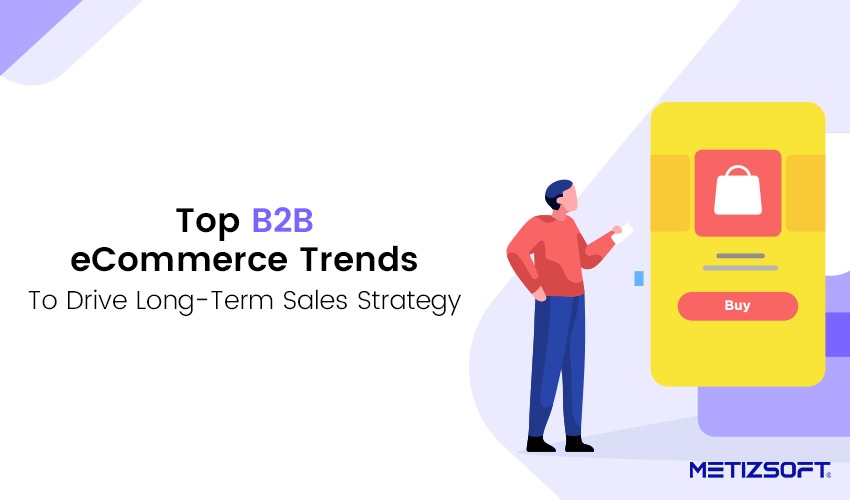
As B2B eCommerce is snowballing, most companies are interested in investing in B2B eCommerce, and it is only going to increase in the future.
In the past few years, a lot has changed in the dynamic B2B eCommerce world. The advancement in technology has resulted in digital transformation in eCommerce marketing. eCommerce drove 13% of total B2B sales in the U.S. in 2019. We can expect global B2B eCommerce sales are to reach over $6.6 trillion by 2020.
eCommerce itself is a growing trend in B2B. The share of eCommerce transactions is growing, but it still lags behind B2C. However, it will grow with the new trends coming up regularly.
In this blog, we will discuss some of the top B2B eCommerce trends in 2020, which will help you drive long-term sales.
Table of Contents
Let us see what these trends are and how they can benefit your B2B business.
Progressive Web Apps
The future of eCommerce is mobile-first. Mobiles are dominating the market, and we can expect that 73% of all eCommerce sales will be made on mobile devices shortly. This is going to be important for B2B sales. Using PWA is one popular way to deliver a mobile-first eCommerce site.
Progressive Web Apps (PWA) deliver highly engaging and user-friendly experiences. Using PWAs, merchants can provide the high-converting, app-like experience of a native app to a broader audience.
A few of the benefits of using PWAs are-
- You can install PWAs on the home screen of mobile devices.
- PWA push notifications engage customers and provide real-time updates.
- PWAs are fast, which is great for your user experience as well as SEO
Shifting towards lightning-fast order fulfillment
More and more B2B companies are entering the digital threshold, and the need for fast and efficient order fulfillment has thus increased. Millennials expect B2B companies to provide quick shipping options and even same-day delivery. Fast and efficient delivery will result in the utmost customer satisfaction of the customers.
One way to fulfill the need for fast delivery is automation. Automating the warehousing process reduces human error and the time taken to store the products. This makes the B2B order fulfillment process even more efficient.
Email marketing
Email marketing is as beneficial as content marketing, and therefore it is an essential part of your B2B eCommerce marketing strategy. Email marketing is the best way to stay in touch with your customers by sending them emails about product recommendations and loyalty campaigns. Some of the tricks, such as sending welcome emails, reaching out to the customers on special days such as sales, reminding them of the abandoned cart, etc., can work in your favor in the long run.
Omnichannel experience
B2B buyers want to know about your company, find the answer to your questions, and communicate with you across the channels. They are shifting transaction volume from single-channel offline to omnichannel experience. The B2B customer uses six different It is not essential to be on every channel, but you have to be strategic.
You need to find two things-
- where are the customers most active?
- On which channel can you deliver the most value?
Concentrating on Customer personalization
AS B2B eCommerce is adapting to create a B2C-like customer experience, one cannot ignore the importance of personalization. Around 50% of B2B buyers identified improved personalization as a critical feature for B2B eCommerce. It helps in building build relationships with online suppliers.
Here are examples of useful personalization features-
- Services based on customer location
- Recommendations based upon earlier purchases
- Customized product catalogs, navigation, and checkout experience
- Follow-up emails and personalized newsletters
Focussing on the content
Content marketing is yet another important and beneficial trend, like email marketing. For the successful running of a B2B business, it’s important to focus on creating unique and funnel-driven content for the buyers at each and every stage of sales. The unique content will be, beneficial it is for your B2B business.
If your B2B company isn’t focusing on creating unique and quality content, you will not be able to make it big in the near future.
Customer loyalty
It is a fact well known that gaining a new customer is more difficult than retaining an existing one. Studies have shown that B2B companies can expect a 25% to 95% increase in their profits by the rise in their customer retention rates. Customer Loyalty holds a high value in B2B eCommerce. The B2B industry focuses on retention and repeat purchases. Companies generate 60% to 80% of their revenues from existing customers. Companies that convert new customers into permanent ones come out in front.
Artificial intelligence and machine learning
B2B companies increasingly use artificial intelligence and machine learning. Large b2B companies mostly use these two technologies, but soon we will see smaller companies taking benefit of these technologies as well. Two significant benefits of these technologies are customer support and product recommendations.
Customer Support- Chatbots play an essential role when a customer visits a store. Customer support can improve the customer experience by providing them with the necessary information about their orders.
Product recommendation- Websites and stores recommend similar products based on your previous purchases using machine language to analyze your buying history. AI delivers personalized product recommendations to customers based on their browsing and previous buying behaviors.
Data and analytics
Your data can boost sales and take your business to the next level if you collect it properly. You will collect data from all the channels like your eCommerce site, omnichannel sales, and social interactions. In the future, there will be more eCommerce businesses that will leverage data from an in-house perspective. Data analysis will become essential for companies in the future to make eCommerce decisions as in-house marketers can make a lot of strategic business decisions.
Some examples of data to collect-
- sales over time by the customer
- sales rep performance
- Product performance
These were some of the B2B eCommerce trends in 2020, which seems to be the next way of doing eCommerce business. If you already have an eCommerce store, you will know how it feels to seem short of time. When it comes to B2B future trends, one has to pay full attention to following these trends to make the most out of them.
The trends mentioned above are going to the B2B companies and helping them earn high ROI in the long run.
Hire the best eCommerce development company for your business
To make things simple for your B2B eCommerce business, you can hire expert eCommerce developers to help you implement these B2B eCommerce trends in 2020 and make huge profits. You can also meet the experts from the Best eCommerce Web Development Company, and they will be able to assist you further.
We hope this blog and the trends mentioned above turn out to be helpful for you and help you reach new heights in the B2B eCommerce industry.
Recommended Reading:
- Magento 2 Mobile App Development For eCommerce Business
- Top 10 Shopify Apps to Help You Win the Upcoming BFCM Sale 2020
AboutManthan Bhavsar
Related Posts
Top 10 Webflow Development Agencies for B2B & D2C
In the multiplying digital landscape, having a robust online presence is vital for businesses looking to thrive in the...
Free Shopify POS App For All Shopify Merchants
Today Shopify is excited to announce that selling in person just got a whole lot easier. Shopify’s point of sale app,...



